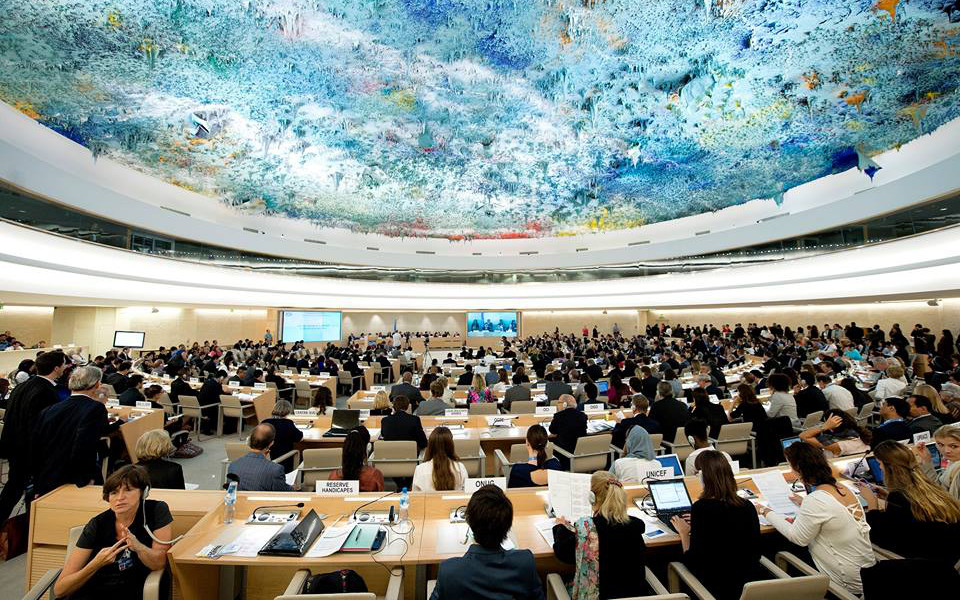5 September 2017 – Today, seven Special Procedures of the United Nations Human Rights Council (HRC) released two recent communications sent to the Government of Bahrain raising concerns about ongoing human rights abuses. These communications addressed allegations of widespread thematic abuses, including violations of the right to life, the right not to be subjected to torture and ill-treatment, the rights to freedom of religion or belief, freedom of expression, freedom of peaceful assembly and freedom of association in Bahrain. The Special Procedures also reported on individual allegations of arbitrary arrest and detention, inhumane and degrading treatment, and treatment amounting to torture, of Mr. Sayed Nazar Naama Baqer Ali Yusuf al-Wadaei, Ms. Hajar Mansoor Hasan, and Mr. Mahmood Marzooq Mansoor. Americans for Democracy & Human Rights in Bahrain (ADHRB) welcomes the WGAD and UN Special Rapporteurs’ communications, and echoes their grave concern over the deteriorating situation of human rights in Bahrain.
The first communication (AL BHR 5/2017), which focused on wide ranging allegations of human rights abuses in Bahrain, expresses the UN’s “grave concern at the growing restrictions placed on the exercise of the rights to freedom of religion or belief, expression, association and peaceful assembly, which is indicative of a clear pattern of criminalizing dissent in Bahrain.” The WGAD and Special Rapporteurs also called attention to the targeting of human rights defenders and political activists by the Bahraini government, as well as members of Shia communities who have been targeted based on their religion or belief. The communication discussed the closures of Al-Wefaq and Wa’ad political societies, and referenced examples of targeted human rights defenders like Abdulhadi al-Khawaja, Dr. Abduljalil al-Singace, and Naji Fateel, along with religious and interfaith leaders like Sheikh Maytham al-Salman and Sayed Majid al-Mashaal.
The procedures further highlighted allegations of torture and ill-treatments by officials, arbitrary detentions, unfounded convictions, intimidation, stripping of citizenship, the use of travel bans and other reprisals for cooperating with international organizations against human rights advocates and civil society actors with opinions that diverge from those of the government. The communication closes by enumerating concerns over “the use of repressive legislation to crack down on dissident,” “the recent executions carried out in Bahrain,” “a growing trend of criminalization of human rights defenders and for charging them for offences for which the death penalty may be imposed in relation to their activities in the defense of human rights,” and “the trying of civilians before military courts.”
Similarly, the Procedures’ second communication (UA BHR 4/2017) explored the mandates’ concerns “at the allegations of arbitrary arrest, torture and ill-treatment of Mr. Sayed Nazar Naama Baqer Ali Yusuf al-Wadaei, Mr. Mahmood Marzooq Mansoor and Ms. Hajar Mansoor Hasan, and the lack of due process in the criminal proceedings against them.” The statement continues by expressing concern about the physical and mental integrity of the mentioned individuals and the objectives behind these measures, which they believe is to “intimidate and impair the human rights activities of Mr. Sayed Ahmed Mustafa Mohamed al-Wadaei.”
“The Special Procedures communications highlight the dire situation of human rights in Bahrain,” said Husain Abdulla, Executive Director of ADHRB. “Bahrain has only increased its repression of human rights activists, political dissidents and entire religious communities through the force of the Ministry of Interior and the National Security Agency, which continue to torture, abduct and intimidate with impunity. We welcome the commitment of these UN human rights experts to highlight and address the crisis in Bahrain, yet governments must follow suit to add support these mandates’ work with political pressure.”
Despite the “grave concern” of UN human rights experts, Bahrain’s primary Western allies, including the United States and United Kingdom, have continued to prioritize security and economic cooperation with the kingdom over human rights concerns. Earlier this year, the Trump Administration announced the removal of previous human rights conditions on F-16 fighter jet sales to Bahrain, and British Prime Minister Theresa May touted the UK as “open for business,” while cultivating closer economic ties with the Gulf post-Brexit.
While ADHRB welcomes the work of the Special Procedures on Bahrain, we continue to see that the Bahraini government shuns these experts. Bahrain has not welcomed a single Special Procedure mandate holder into the kingdom since 2006. Meanwhile, every Joint Communications Report released since 2011 has included fresh human rights concerns. We urge all States at the Human Rights Council to follow up on the work of these mandates and to collectively condemn in the strongest possible terms the Bahrain’s ongoing human rights crisis.





